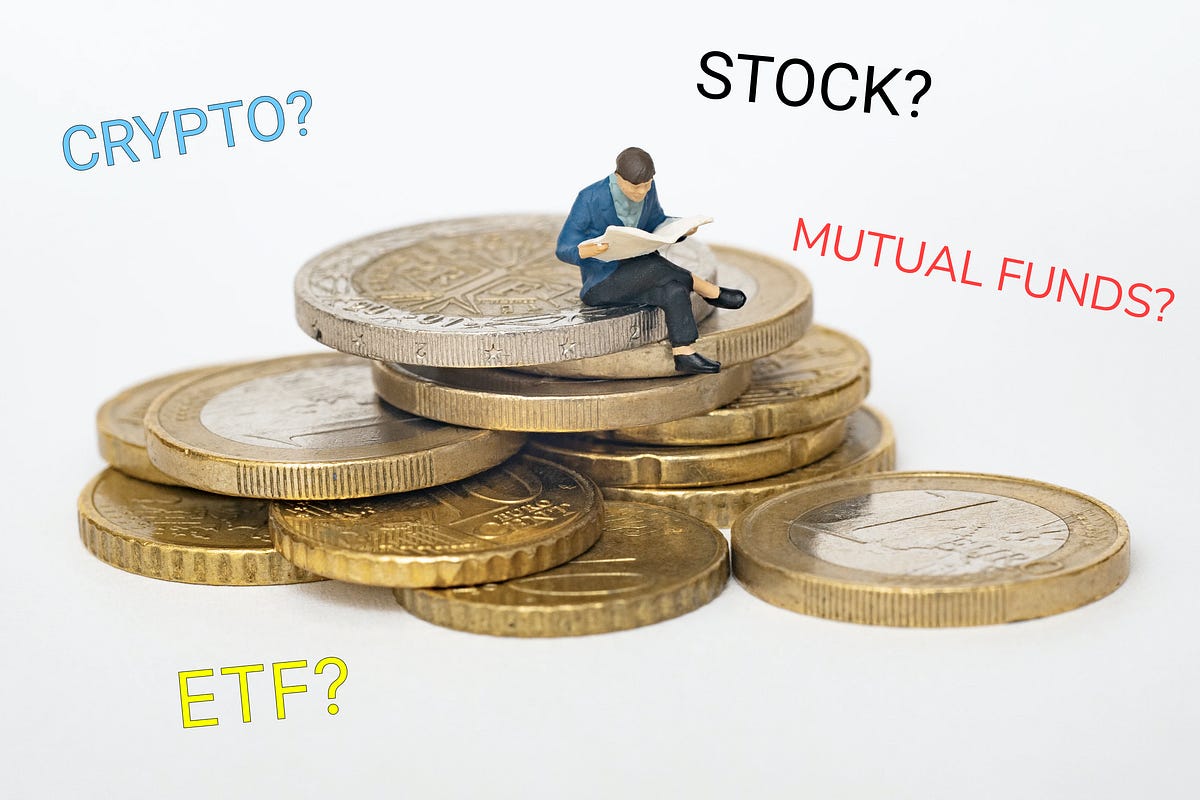Where do I invest my money in India?
Have money, but don't know where to put it? Here are some ideas.


Hey all, so I've written about Personal Finance previously. I've linked to various Personal Finances resources and talked about my thoughts on it in this blogpost.
Disclaimer: None of this is Financial Advice, I recommend you to do your own research before making any investments. Also, none of the statements made here should be taken as absolute fact, I'm in the process of learning myself and admittedly am at a very early stage of the journey.
I'm currently going through a transition period at work for the next couple of weeks, so I'm not getting enough time to work on my content or my projects so far. My next major dev-focussed blogpost will (hopefully) go out next week, but meanwhile I wanted to talk about something I've been focussing on recently, which is money and investments.
Investing is a major component of life, and for achieving financial goals like buying a car, buying a house, or even reaching FI/RE (Financial Independence/Retire Early). This is because money which is sitting in your savings account or Fixed Deposit actually loses out against inflation (which peaked at ~12% for India after the 2008 Housing crisis), whereas money invested in a good stock or ETF (Exchange Tracked Fund) can give you multiples in returns over a period of multiple years.
This covid crisis also made me ask questions like Which financial instruments should I invest in? and How much should one invest in them? and also go about searching for their answers. So, here are some of the solutions I found and adopted through my research.
Financial Instruments are tradable assets meant for investment like FD, ETF, stock, Mutual Funds, etc
1. Which financial instruments should I invest in?
To answer this, let's look at what financial instruments are actually available to invest in for a retail investor :
Retail Investor, ie, not a bank, financial institution, or institutional investor
Fixed Deposits: These offer the lowest interest rates of all financial instruments but offer maximum relative safety among all instruments. The ease of withdrawing money from Fixed Deposits is also easier, depending on the contract. Therefore, it's generally recommended to keep your emergency fund in FDs.
Public Provident Fund (PPF): Having a 15-year lock in period at an interest rate of 7.1%, PPFs are for the money which you are willing to kiss goodbye (or save tax on) for that period of time. You can only invest upto 1.5 Lakhs in a PPF account in an year, which conveniently coincides with the 1.5 Lakh limit on the 80C tax-saving investment. There's no real discussion about investing to have here, if you can afford to, you should always max out your PPF investment.
Stock/Mutual Funds/ETFs: This is the most famous financial instrument and what stock-brokers, banks, anyone who wants your money will try to sell you on. Brokers can earn a lot of commission on these, so I heavily recommend you to do your own research on any stock/MF/whatever before letting someone handle your money, or better yet, invest by yourself through one of many commission-free platforms which have cropped up online. I personally use kuvera.in, feel free to use my invite code
WND8Yfor some free digital gold (or don't). Now, to explain what the above terms mean in my words:Stock: Stock of a company is a part of the total shares in which its ownership is divided. The stock of a company is freely tradable in the stock market and can go up or down depending on multiple factors like market conditions, performance of the company, any favourable government policies, or even someone's tweets!!
The simplest way to earn money in stocks is buying when the stock price is low, and selling when it's high. Although, that's not easy, as there are millions of day traders1 trying to do the same. So, it's generally recommended to only invest in that stock which you are willing to hold on for a longer period of time to sell later on at a higher price.
To reduce risk, it's recommended to hold on to multiple stock at a time, which is where Mutual Funds and ETFs come in.Mutual Funds: Mutual Funds are investment funds managed by a fund manager (someone who manages the fund), in which the money of all investors is pooled (collected or collated) and invested into a set of stock. The investors then receive returns based on the amount which was invested and the returns of each stock invested into by the fund (kind of like a weighted average). There's a lot to learn here so I recommend going through this course by Zerodha.
Mutual Funds are generally safer than direct stock investments if you do not have enough time to research individual stocks and make your own judgement. However, you do end up relying on the biases of the fund manager, so research your Mutual Funds heavily before choosing them.Exchange Tracked Funds: ETFs, index funds, or whatever else you want to call them are the most famous and most recommended financial instruments of the bunch. This is because instead of being managed by a human, like a fund manager, ETFs track exchanges, or a subset of an exchange instead. Eg, a NASDAQ ETF will track America's stock market (this is a very simplified explanation), an ETF for Nifty 50 will track the 50 largest companies on India's stock market.
Investing in ETFs over other instruments is recommended because it's generally shown that an investment in the market itself (via ETFs or index funds) generally beats any active stock trading effort or even multiple Mutual Funds. This theory was most publicly popularized by the book A Random Walk Down Wall Street where the author says "asset prices typically exhibit signs of a random walk and that one cannot consistently outperform market averages".Crypto: And finally, I come to the black sheep in the finance room, which everyone keeps talking about but no one really understands, crypto. At the present time (as I have read and understood) any investment into the cryptocurrency market is a big Ponzi scheme2, or pump-and-dump scheme3.
However, there of course are true believers of crypto, and it might be extremely ignorant in hindsight to write-off all of crypto as those statements.
In any case, this is the most volatile asset of them all, with prices going up or down 400% in a day depending on someone's tweets. Also, the crypto market doesn't sleep (have any fixed hours), so you will have to depend on some form of automation to keep your investments safe. Needless to say, do your research well ;)
2. How much should one invest in them?
As we've already looked at what each of the Financial Instruments do, let's look at how much you should be investing in them:
- Fixed Deposits: As we previously discussed, since FDs are the safest of all instruments, you should have all, or part, of your Emergency Funds in FDs. This fund is for emergency like loss of job, medical emergencies, or anything else. It can vary from 2-6 Lakhs, depending on your personal needs.
Personally, I choose to have half of my emergency fund in a high-interest, fast withdrawal FD, and the other half in my savings account. - Stock/Mutual Funds/ETFs: These are the assets you should primarily be investing in, since they will be giving you the maximum returns. Personally, I focus on ETFs with a secondary focus on Mutual Funds for things like debt, investment in tech stock, etc.
How much you should invest in a monthly basis depends on what your monthly expenses are. The more you are able to save, the more you should invest here, barring your emergency fund and PPF accounts are filled out.

- Crypto/Day Trading: And finally, we come to Crypto trading. I pair stock day-trading and crypto together because both are speculative investments. You should only invest as much as you're willing to lose, because either the underlying asset is highly volatile, or making those trades can actually make you end up losing money.
Personally, I've made a small initial investment in Crypto on which I've made a return of multiples, but that is purely because of the volatile nature of the market. I could just as easily lose my investment + returns on any day because someone on Twitter doesn't like the coin. I use WazirX to invest in and manage my crypto investment. Whether you yourself should invest in Crypto depends on your risk appetite.

Conclusion
That would be it! In case you have any questions or comments to add to this, feel free to write them below 😄.
Day trading is a form of speculation in securities in which a trader buys and sells a financial instrument within the same trading day
Ponzi Scheme: A Ponzi scheme is a fraudulent investing scam which generates returns for earlier investors with money taken from later investors. This is similar to a pyramid scheme in that both are based on using new investors' funds to pay the earlier backers.
Pump-and-dump Schemes: Pump-and-dump is a scheme that attempts to boost the price of a stock through recommendations based on false, misleading, or greatly exaggerated statements. The initial investors then sell their stock at a profit.
